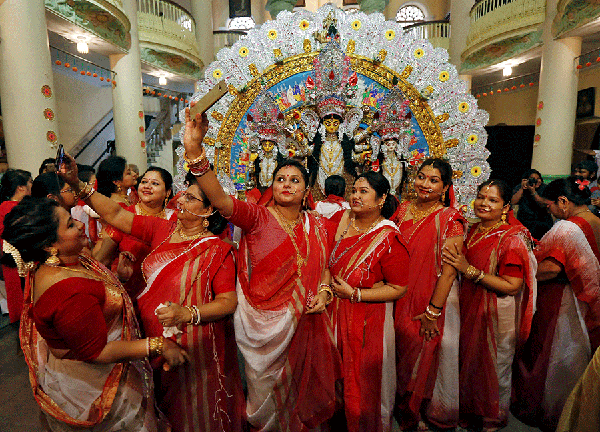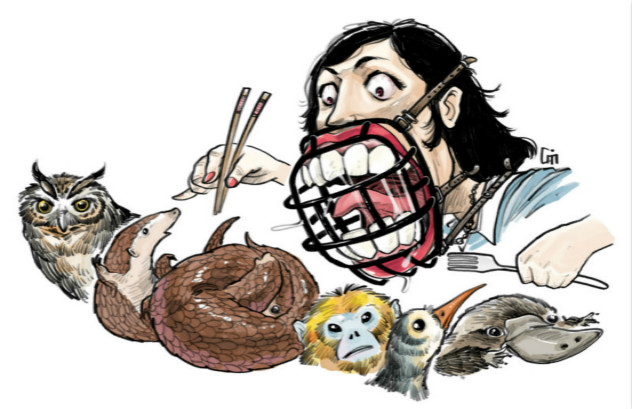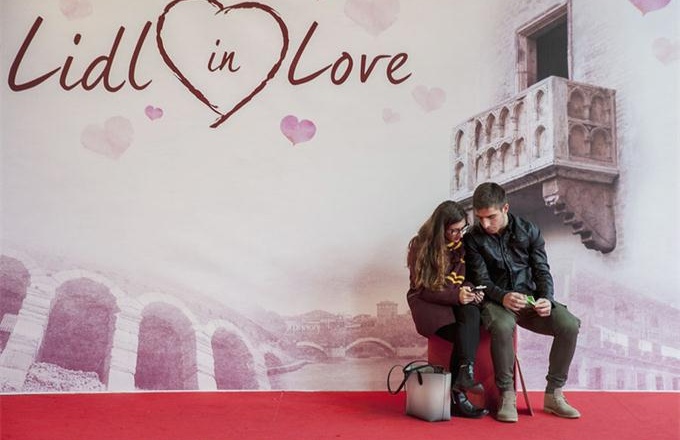Looking for true meaning, rather than photo ops
 |
|
Hindu women use their mobile phones to take pictures after worshipping the idol of the Hindu goddess Durga on the last day of the Durga Puja festival in Kolkata, India October 11, 2016. [Photo/Agencies] |
Last year during Spring Festival, two friends of mine and I decided to make a short trip to India for 10 days. Since we were on a budget, we couldn't travel thoroughly all over country and planned to limit our visits to New Delhi, Agra, Goa and Mumbai. Similarly, we conducted our travels as cheaply as possible and saved our money whenever we could.
Everything went as planned. We had great time, but I think we also experienced things that are not a typical tourist experience. Since we were on a budget we actually spent lots of time on the road in farmers' or workers' cars or in the cheapest hard seat along with regular folk. I believe that since we didn't dine in expensive restaurants or utilize the main touristic attractions (talking of entertainment) we had the chance to observe how the reactions of tourists and common people differed. It was completely irritating.
You go to a temple and see native people praying or chanting, while a tourist takes a selfie, imitates the natives praying or does some kind of a pose that reflects the image they have of the temple, religion or the people, whatever. For example, near the Taj Mahal it is possible to observe the residents heading for prayer or praying just a few meters ahead while finding a tourist trying to pose in a supposed-to-be-an-Indian-thing posture. Furthermore, foreigners taking photos of weddings and funerals of locals from a safe distance –occasionally selfies– while having a bite and a drink like they are watching some kind of a show is not an extraordinary sight.
But such sights are not sui generis to India. In any country the same folly is taking place. Any relic or attraction with cultural, historical, religious meaning is exploited by foreigners. We (everyone on this earth, I am not sparing any nation) simply go to a country and take photos. Nothing more. Interpretation of meaning and comprehension are limited to putting on the traditional clothes of locals at most. You eat some local food, try some traditional clothes and take a selfie with gangster pose around some cultural or historical attraction, voilà!
Maybe some of us have done it, or witnessed it being done by others. People taking selfies in the Holocaust Memorial in Berlin, tourists doing the Nazi salute in Auschwitz, foreign tourists pretending to be meditating in Buddhist temples, names dug with nails into holy and/or cultural sites "… was here". I am sure everyone has fallen into the same wantonness at one point in their life or witnessed it. I remember one time my friend and I was listening to Turkish poet Can Yücel's poems about death and love with light folk music in the background when we were in the United States and as soon as my American friend came into the room she started doing belly dancing. This is just absurd. Then what is the source of this glibness that we all seem to fall into sometimes?
Why are we so shallow?
I believe this phenomenon is not any particular person or group's fault. But in a world that we seem to know so much about we are becoming more superficial with every piece of information. We have access to knowledge all the time, yet the more knowledge we pick up, the further we seem to be from embracing the meaning. I am not sure what the reasons are behind this but I will blame it on capitalism first of all.
As the world is more globalized the meaning seems to be attached to materialism. The perception is shaped around the economic worth of it. Monetary benefits are behind the display of culture within a consensual agreement from both the visitor and the host. The host displays his/her culture for $10 at the entrance and visitor gets to do as she will for $10. But actually, it is not only these $10 that is mending your understanding. You have worked for months, maybe years, to come to a place, worked hard for every single penny, paid for your plane tickets, hotel and entrance. Of course, since you are going to pay for it, the host is going to present his/her "goods" in the best marketable way. Now your comprehension of this new world is valued by the dollars you have brought with you, and you will get the best of it. Not just watching it or waiting there, you will enjoy it because you deserve to.
Secondly, maybe our quick access to information today is actually keeping us from learning. We learn so much from the internet and books when we go to a place, we are unable to learn from it because our prior knowledge is screening that new information from getting inside our heads. Let's say you are a sinologist studying Taoist understanding of the afterlife and you have published papers, books on it. But you are going to China for the first time and when you get to a temple in China, do you think you would get new information easily or would you look at things with a verifying eye like –'yes I know this, I know that'? In my opinion it is the latter. Likewise, for example, I am really fascinated by Korean culture, but not only have I never been to South Korea, my understanding of Korea is mainly based on contemporary Korean literature, rather than any real information. So if I went to South Korea tomorrow, wouldn't my understanding of Korea be based on the image I already have of it?
So how can we get to the meaning? I don't have the answer but I have few ideas.
Conclusion
What can be done in order to protect our own values and culture that is residing in art, objects and sites, as well as, have an investigating mind with a respectful attitude. We cannot expect anyone to have the same feeling towards our culture since it needs years of understanding or expect ourselves to have the same understanding with the locals when we visit a place for the first time, especially if it is really foreign to us. But what we can do is to try to omit our predefined information about the places we visit and understand what is going on. Yet, at the same time we must try to have a balance between receiving information and interpreting it. Likewise, we can observe other people and see how they treat their own culture. Only after that can we perhaps surpass this superficiality and have a real taste of the world around us.
(Opinions of the writer in this blog don't represent those of China Daily.)


















